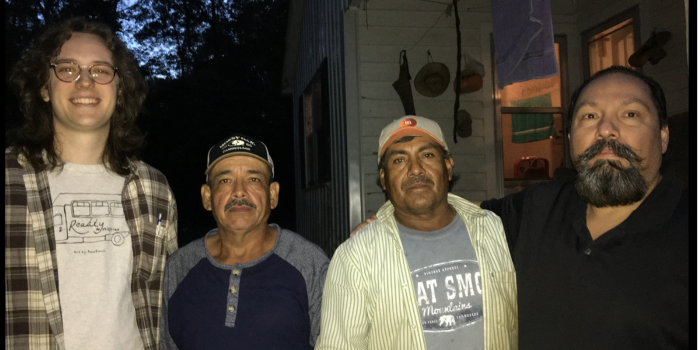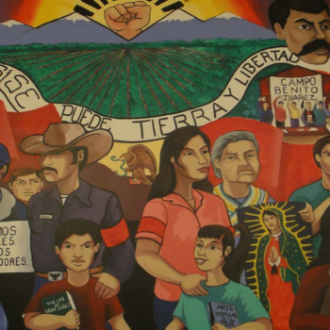
A reflection by Payton Price, NFWM’s school year intern from Duke Divinity
On October 10, I visited a few farm workers at labor camps as they were finishing their tobacco harvesting season. We visited the rural areas around Dudley, NC, going no little distance away from highways to arrive at the housing on labor camps. Two things resonated with me about these visits. First, the transience of migrant farm worker realities and the isolation of their contexts. And second, when I asked farm workers what the most important thing is for seminarians to know about them, their answers were generally that their jobs are dangerous and they deserve recognition and protection. In some sense, my vocational formation found itself hinged on these points—between displacement and presence, between disinheritance and justice.
In the dark, well off the main highways, I arrived at a house whose residents have nicknamed it La Casa del Diablo, or the “House of the Devil,” for its ominous aura and eerie sounds it makes in the nighttime. Some of the tobacco farm workers who lived there jokingly said that they often carry a crucifix with them if they tiredly wander through the house at night. Their tone was lighthearted, probably because they had just rounded out their last day or so of work for the season. Some were heading back to their families the next day; others were extending their time in the US by working in Christmas tree farms. At another labor camp, just as remote and unlit by any streetlamps as the last, we came upon a few farm workers who had just sat down to eat after a twelve-hour workday, about to celebrate having only one week left to work in the season. Being friendly and accommodating to their guests, they sat us down on their few chairs in their common area while they stood and left their full plates of food on the table so that they could give us their full attention as we asked them about their concerns.
One topic of conversation rolled off the next, each being translated by the labor union organizer who had invited us to join him in these visits. I asked them, what is it that farm workers want seminarians, and US citizens more general, to know? Farm workers want recognition. They are here because we citizens don’t do the work—and we won’t do the work. It is a necessary job to sustain our food system, but it is also a dangerous job. The farm workers cited several farm worker deaths that they had heard of from this year alone. They want to make money and return to their families—families they already spend most of each year away from. And so, I now realize upon reflection a week later, those same houses occupied by farm workers are, as of today, empty. They have (mostly) moved back to their families. The fields are barren, fully harvested. No trace is left of their presence. Their remote location, their usual periphery to the public eye, is now completely wiped. If you missed it, you missed it. Visiting now, you would have never known they had been working from before sunrise to after sunset for months. Later, I had to ask myself, if no one came to visit, if no one knew of their presence, if no one inquired about their rights, what would we even know about them? Migrant farm workers face a life of transience, isolation, and living in a state of being forgotten repeatedly.
Farm workers need their labor protected, and to help them in their fight for fair wages, better living conditions, and safety in their work, we who benefit from their labor but who contribute none of our own must be willing to devote the sort of time and attention to advocacy that is, by systemic default, non-existent. Our food system, our system of laws, and our meritocratic values are all meant to draw our attention away from farm workers.
And at the end of each visit, the farm workers asked me to pray for them. I was surprised at first. I almost forgot that my role there was as a seminarian—I was almost taken aback that I would be tasked with leading our group to turn our attention to God in prayer! And, in some sense, was I asking God to turn attention upon us? Where does God’s attention lie anyway? Is God in the labor camp and in the heat of the crop fields? Where is God when the rich and powerful find new ways to devalue the humanity of farm workers? It seems that for every win, a new form of oppression is invented. So, is God entirely absent? Or is God living in the insistent activism of the farm worker movement?
They ask, would you pray for us? They demand, we deserve recognition. We deserve rights. We deserve protection. We might find it in ourselves as US citizens to admit what jobs we refuse to do to contribute to our food system, but will we also follow where God calls us to be present, in the places where people are displaced? We might be willing to pray for farm workers, but are we willing to stand alongside their movement for justice? To be more pointed: If God is in the farm worker movement, can the same be said of the church? Is church part of the broad therapeutic system that directs our attention away from the disinherited among us? If so, how might the church join alongside what farm workers are already doing—what God is already doing among farm workers?


